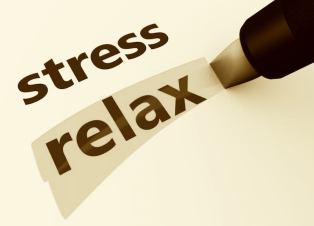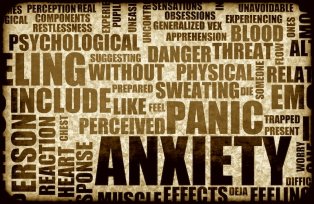 Control Your Anger & Irritability
Control Your Anger & Irritability
Feeling angry at times is a pretty universal experience.
It's one of a small number of emotions that seem to be recognised across many cultures and countries - just from people's facial expressions.
In its mildest form, anger is often described as irritation or annoyance, and at the other extreme - words such as fury and rage are used to capture the intensity of feeling and expression.
We tend to experience anger as a 'hard to resist' emotional response to a perceived provocation, hurt or threat. It appears to be closely linked to our survival instincts - where we need to act quickly in response to an immediate danger. In these circumstances, anger is a healthy and important defence mechanism.
Because anger is designed to be an extremely rapid response to an urgent situation, it often feels like there is no time to calculate or factor in the potential longer-term consequences of any action we are being urged to take.
If we let our anger be fully expressed verbally and physically in less dangerous circumstances, we may then look back with considerable regret on having allowed this to happen.
So, not managing our anger effectively in certain life situations can be a significant problem. In addition, anger may be used by us to mask other negative thoughts and feelings that we do not want to face or have others discover - which can cause us additional difficulties.
A significant challenge that many of us have in relation to anger is that…
We are uncertain as to what level of anger, if any, will be appropriate and proportionate for us to express in any given situation.
For instance, how we may choose to express anger at work to our boss (i.e. probably rarely or never) is likely to be somewhat different from how we might allow ourselves to act at home. All too frequently, this can open up the possibility of our unexpressed angry feelings relating to one thing (work) being unfairly expressed to a loved one (at home).
And rather unfortunately, expressing our anger even when it's inappropriate or disproportionate to the circumstances & the events that preceded our outburst, can provide us with a few short-term benefits that may be quite compelling. These include…
Feeling extremely alive, full of energy and having an unwavering sense that our viewpoint is the only one that can be sensibly taken.
When we are angry, our 'emotional' mind is 'centre stage' and there is no room for our 'rational' mind to function. It is usually impossible for us to 'think straight' until we have calmed down.
In the middle of an angry outburst our judgement is seriously impaired.
Because our more primitive 'inner mind' is so quick to become angry we need to 'play for time' in order to allow our more balanced conscious mind to take back control.
A person who has issues with anger tends to be:-
- Often Irritable or ‘Short-Fused’
They experience low to mid-level anger fairly regularly and it intrudes into their life, and impacts on those around them, in an unhelpful way; OR- ‘Out of Control’ When Expressing Their Angry Feelings
Their extreme anger can potentially lead to them having significant regrets about how they've behaved after the event. And, not surprisingly, may result in other people feeling unsafe around them.Of course in some cases, a person will be facing both issues.
In nearly all modern day situations when we begin to feel angry, fully venting our anger or completely denying it is either likely to make things worse or store up problems for later, and of course sometimes both of these outcomes occur. So, what other options are there?
In order to answer that, let's step back a bit…
When we feel angry it's always the case that something has acted as the trigger - setting things in motion. The trigger could be any one of a number of things… an external event, a person talking or doing something, or even some thoughts in our head.
Whatever the nature of the potential trigger, it's the meaning we decide it has for us that can lead to our inner mind generating feelings of anger.
However, in modern society we seem to have been encouraged to view any potential trigger as the cause of our anger. This clearly isn't the case, otherwise all of us would be angry about exactly the same things. And yet at times, many of us are drawn to thinking that something or someone is making us angry.
By repeatedly using language that validates this faulty view of reality we are choosing to actively disempower ourselves.
And for as long as we mistakenly think others have the power to make us feel things, it stops us from discovering where we can potentially find the solutions to our anger issues - namely inside ourselves.
So instead of saying…
'You made me feel angry when you said [...] to me.'It is more accurate & helpful to say…
'I feel angry because I told myself it meant [...] when you said [...] to me.'
By practising taking this stance we can regain our personal power and start searching inside for answers to the question:- “What is giving rise to my anger & irritability?”
If we don't do this, we are likely to keep looking to our external world for solutions and for others to blame for our anger problems.
Once we’ve found the answers to the 'What' question, we can move onto exploring 'How' we can change things for the better.
Q. How can we work together to address your anger & irritability issues?
Each person's situation is unique, so the following is only an outline of some possible steps that may prove to be beneficial in assisting you achieve your aims in this area:-
- Understand The Issues & Clarify Your Aims
- Anger Audit
It can be useful for us to build up a detailed picture of your anger situation, particularly taking note of:-- The nature, duration and perceived severity of each incident;
- What you consider the triggers to be for each occurrence;
- Your inner dialogue (a.k.a. self-talk) during each incident, the extent to which your behaviour reflected your inner sense of anger, and the immediate & later consequences of you expressing your angry feelings (when you did so);
- How the overall situation has evolved over time;
- The impact of your anger & irritability on you, your loved ones, and everyone else who regularly interacts with you;
- Life Review
Anger issues rarely happen in isolation, so it can prove important for us to explore other factors in your life that may be contributing to your troublesome levels of angry feelings.
It may be the case that what’s missing from your life could have a significant bearing on things too. We will also determine the inner resources you can draw on, that have assisted you in responding well to life challenges in the past.- Areas of Life: Home, personal, work, social & community;
- Health & Fitness: Physical & emotional health, including exercise regime;
- Life Demands: Responsibilities & levels of stress;
- Recovery: Quality & duration of sleep;
- Diet: Quality and quantity of food & drink consumed;
- Inner Resources: Life values & core beliefs - including your views about feeling & expressing anger. Self-labels/identities and other personality traits, such as impulsiveness vs self-control;
-
Personal History: We take a broad brush approach initially.
Later on, a number of specific memories & experiences from your past may be recalled by you in our sessions.
Only where they appear to be connected in some way to your anger issues will these be explored in depth, with a view to gaining important insights and, where appropriate, achieving a high level of emotional release & resolution; - Future Life: Career goals & personal aspirations;
-
Missing Elements: Each of us is likely to have some important emotional or physical needs that we are currently not fully satisfying.
Depending on how extensively and significantly this is the case it can greatly affect our ability to function well day to day.
Any frustrations that stem from these unmet needs can lead us to more easily feeling irritable, angry and resentful as a result.
- Clarify Objectives
Based on what's discovered during the above process, it may be useful to clarify the precise results you want to achieve from our work together and to create a number of 'stepping stones' to help you reach your overall aims.
- Anger Audit
- Hypnotherapy for Your Anger Issues
- Supporting Your Overall Wellbeing
You can potentially reduce the likelihood of you regularly feeling angry or irritable by making a number of lifestyle changes that support your overall wellbeing, such as:-- Establish Healthy Sleeping Patterns
Creating a new bed-time routine that assists you improve your sleep, can help you recover more easily & fully from your daily stresses, and in turn could reduce your level of irritability; - Make Time to 'Switch Off'
Making space in your day to become less stressed and more relaxed, plus undertaking some regularly-scheduled physical exercise should enhance your mood and make feelings of anger far less likely; - Improve Your Diet
Moving away from processed foods towards fresher produce can provide immediate benefits such as improved mood & increased energy levels. Which in turn could lead to you experiencing irritability & anger somewhat less often;
Reducing your consumption of coffee and alcoholic drinks can also prove helpful:-
Drinking coffee will usually trigger a release of stress hormones into your body and once this adrenal high disappears you are likely to feel increased irritability and fatigue. Having less coffee, makes a lot of sense for your overall wellbeing and in helping to reduce your general level of anger & irritableness;
Typically, consuming alcoholic drinks lowers your threshold for emotional arousal of any sort - including anger.
So drinking less will usually strengthen your emotional self-regulation and enhance your defences against feeling angry as often as you have been doing.
- Establish Healthy Sleeping Patterns
- Addressing Specific Areas
Your anger & irritability issues will have been explored in some detail in your Anger Audit & Life Review and we will now work together to address them:-- Low Self-Esteem
For some people, problematic anger can go hand-in-hand with them having less than optimal self-esteem. If you are affected by this, you may feel particularly 'thin-skinned' and that a wide range of things seem to trigger your initial feelings of anger or irritability.
Where this is needed, we will work together to boost your self-esteem through the use of powerful suggestions that reflect your own 'inner world' language & metaphors. And as part of this activity we may need to ‘go back to’ some of your earlier memories/experiences and help you release the emotional charge around them.
By doing so it is likely to give you a completely different perspective on those troubling historical events and provide important insights into how you can address your current anger issues. - Missing Elements in Your Life
If there are significant areas of your life that you are profoundly dissatisfied with and that you want us to address, then these will need to be worked on separately - possibly before we complete your anger issue sessions.
However, if your dissatisfactions are more modest, we will devise an action plan to support you in taking the first steps to satisfy them as part of our anger issues work. - Extreme Anger
Where extreme anger is part of your overall issue it could be a result of you having previously experienced a number of traumatic events. If that's the case, it may be useful for you to benefit from a trauma resolution approach that is often used to assist people who have Post-Traumatic Stress Disorder (PTSD). - What Leads to Your Anger & What Makes it Worse?
The starting point for each anger episode you have, will be either:-- External
Where a person or situation has contributed to you being highly aroused and your subconscious mind has automatically provided you with an initial emotional response of anger.
Your inner mind will have selected this particular emotion based on your beliefs, attitudes & expectations and the specific circumstances; OR - Internal
Where your thoughts have given rise to your angry feelings.
Often this happens when we have been ruminating about past hurts, or vividly imagining that a person will do something that will annoy us in the near future.
Or it could be we are reflecting on a recent event that mildly irritated us and our self-talk/inner dialogue about it is ‘stoking the fire’. As a result, our anger starts to build and build;
- Checking For Patterns in Your Anger Triggers and Self-Talk
Your 'Anger Audit', 'Life Review' and 'Anger Diary' will usually reveal various types of trigger and self-talk that can be grouped together - greatly reducing the amount of work involved in making progress on your anger issues.
When we explore your self-talk we are likely to discover various beliefs and attitudes that contribute to you feeling angry as often and severely as you do.
There may also be some biases in your thinking that distort your view of what's happening around you - making you more susceptible to taking offence inappropriately or disproportionately.
Common thinking errors/biases that many of us can fall into at times include:-
- Highly-Selective Data Gathering
Deciding to only be aware of a small part of the details in a situation - which can often greatly distort our perspective. - Mind-Reading
Acting as if we 'definitely know' what someone else is thinking, their intention or their motivation. - 'Black or White' Thinking
Not allowing ourselves to see that in most situations there are more than two 'all or nothing' options available to us. - Falsely Extrapolating From Just a Few Events
Using phrases like 'he always…', and 'she never…' rather than taking care to make more accurate statements such as:- 'the last 3 times he…' and 'she occasionally…'.
- Highly-Selective Data Gathering
- 'Stoking The Fire'
Instead of actively working to defuse our troublesome anger we can sometimes find ourselves:-- Escalating an argument by only drawing on supporting memories from the past;
- Venting to friends about an annoying event with a view to them supporting our position; OR
- Re-living angry moments in our mind with a view to 'proving' we were right to feel the way we did…
- What's Behind Your Anger?
Sometimes your anger will act as a protective shield or mask for other negative thoughts and feelings that seem too 'raw' or 'sensitive' for you to fully experience.
If this is something that affects you, we will work together to encourage these hidden 'elements' to come to the surface of your mind and then aim to sensitively address them.
- External
- What Can You Do?
Focussing on 'changing' other people is rarely, if ever, an effective strategy and is more likely to frustrate you and inflame the situation.
Whether you fully express your angry feelings or do the reverse and totally suppress them, neither of these actions is likely to be a productive approach that will be good for your wellbeing.
So what are some of the alternative approaches that can help you achieve your aims via hypnotherapy?
In addition to you making improvements to your overall wellbeing, successfully addressing your anger issues is likely to involve implementing a number of adjustments in your thinking, physical responses and behaviour. Sometimes an approach will be a combination of all three:-- Change Your Self-Label
Go from thinking of yourself as an 'angry' person to an individual who sometimes has angry feelings. And when you do feel any initial anger, firmly believe that you are someone who always acts on this in ways that serve you both in the present & longer-term. - Leverage Your Existing Values
Get in touch with any strongly-held personal values you have that are undermined when you are tempted to fully express your anger. And then harness those values to disrupt your usual pattern of anger-escalation behaviour. - Anger as a Helpful Alert
Be grateful to your inner mind that it’s promptly alerted you to what it believes to be an important 'threat'.
Aim to celebrate your anger as a ‘flag’ urging you to take some corrective action. Then spend time figuring out what the best action is, in a considered and calm manner. - Thank Your Threat Protection
Think of your subconscious as a guard dog that wants to be appreciated every time he shows he's acting to protect you. - Wait Until Later to Calmly Communicate
Studies have shown that one of the most productive and healthy strategies in situations where you feel angry towards another person is to withdraw, wait until you have both calmed down, and then make contact with them again with a carefully considered & reasonable approach. - Focus on Achieving Your Goals Rather Than on 'Being Right'
The more you can keep clearly in your mind what you want to achieve and take positive action towards that, the easier it is to overcome the temptation to make someone else wrong through expressing your anger or reacting to their emotions. - Create a Safety Bubble or Defence Shield
If you need to put yourself in the 'firing line' and are concerned that a person you find difficult may provoke you, create an imaginary 'safety bubble' or 'defence shield' that is wrapped around you for extra protection. - Replace ‘Stoking The Fire’ Thoughts With Perceptions That Calm You
Instead of focussing on "The world seems to be permanently against me"… remind yourself that "The world can seem unfair to everyone at times".
Rather than thinking "How dare he say that to me?" choose a more tolerant alternative viewpoint… "He was quite abrupt, however perhaps he’s just had some bad news - let me not add to his troubles by getting annoyed".
Altering the ways you think in response to your initial anger could be enormously important in helping you free yourself of your current issues. - Develop Helpful Habits
Any non-destructive habit or action that delays you needing to respond when you are angry can be helpful. Commonly used habitual actions include ‘counting to 10’, a few deep breaths, ‘sleeping on things’, hypnotic relaxation, walking away from arguments/confrontations or using a number of calming activities to distract you. - Let Go of Your Angry Feelings
A very powerful approach for when you are angry with someone who you cannot reach, is to go back and vividly re-experience a number of key memories that you have about them, as if you were there. Making sure that you do so with a view to letting go of your anger once and for all.
And as part of completing the process, it may be useful for you to forgive the person for their actions and forgive your younger yourself too - so that you can finally 'move on'.
- Change Your Self-Label
- Low Self-Esteem
- Supporting Your Overall Wellbeing
As with all forms of therapy - the precise results achieved may vary from person to person.









